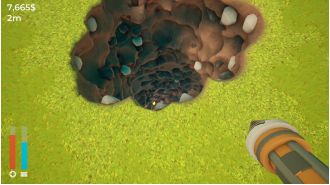Eco-friendly knives made from beach litter and laughing gas canisters by a skilled blademaker.
Ex-chef Tim Westley's hand-forged knives, made from unique recycled materials, are coveted by UK's top chefs; crafted in Dumfries using steel, laughing gas canisters, and beach litter.

As someone who has spent years working as a professional chef, Tim Westley understands the true value of a good knife. It comes as no surprise that his hand-crafted knives, made from unique and recycled materials, are highly sought after by top chefs in the UK. Tim creates these remarkable eco-friendly blades in his workshop located in Dumfries and Galloway, using steel that he collects from discarded NOx canisters found in Glasgow and London.
The handles of Tim's knives are just as special as the blades themselves. He melts and reshapes plastic from spent shotgun cartridges provided by local estates and shooting ranges, as well as items like fish trawler boxes that wash up on nearby beaches. This idea for his business, Clement Knives, came to Tim when he was living on a narrowboat in London and had a workshop on an island in the Thames. He would often take his canoe out to collect litter polluting the river, and he started to think of ways to repurpose this waste in a positive way.
After watching an online video about knife making, Tim decided to give it a try. While the process of molding the plastic handles is more modern, the rest of his methods are deeply rooted in tradition. Tim relies on tools that have been used for over 200 years, some of which date back to before World War 1. "A really good knife is essential for those who love to cook, especially for professional chefs who use them all day, every day," Tim explains. Having worked in various British and Australian restaurants himself, he knows firsthand the importance of a high-quality knife.
One of the first chefs that Tim showed his knives to was Douglas McMaster, founder of Silo London, the world's first Zero Waste restaurant. The two quickly became friends, bonded by their shared passion for a zero waste lifestyle. "My knives are made from materials that I have personally recycled about 95% of," Tim proudly states. Each knife is meticulously crafted using blades that Tim forges in his own workshop. "My knives are not only unique in their values and appearance, but I am confident that they are also exceptional working tools," he adds.
It takes Tim approximately 20 hours to create just one of his knives, and he currently produces about six per week. They range in price from £100 to £300. Finding the materials for his knives is relatively easy, and Tim even finds the process of foraging on a wild Scottish beach to be therapeutic. "It all starts with collecting the materials," he explains. "The NOx canisters are gathered from the streets of Glasgow and London, while the plastic is mainly sourced from the beaches of Wigtownshire."
Before beginning the forging process, Tim thoroughly cleans and sorts all of the materials. The canisters are flattened and then forge-welded with a core of high carbon steel to create a billet. From there, he forges, heat-treats, and grinds each knife individually in his workshop. As for the plastic, Tim chops it up and injects it while hot into his handle molds, which are made from used aluminum beer cans. "Most of my handles are made from various types of polyethylene plastics, many of which are discarded fishing gear," Tim explains. He also notes that sometimes he finds items on the beach with foreign words, giving a glimpse into their far-reaching origins from places like North Africa, North America, and even other parts of the UK.
For those interested in seeing Tim's unique craft in action, they can visit his forge in Newton Stewart during the annual Spring Fling Open Studios Weekend. This event showcases 104 studios throughout Dumfries and Galloway. To learn more about Tim and his work, visit www.spring-fling.co.uk. And for more news stories and to read the latest issue of Scottish Field, be sure to subscribe.
2 Views










